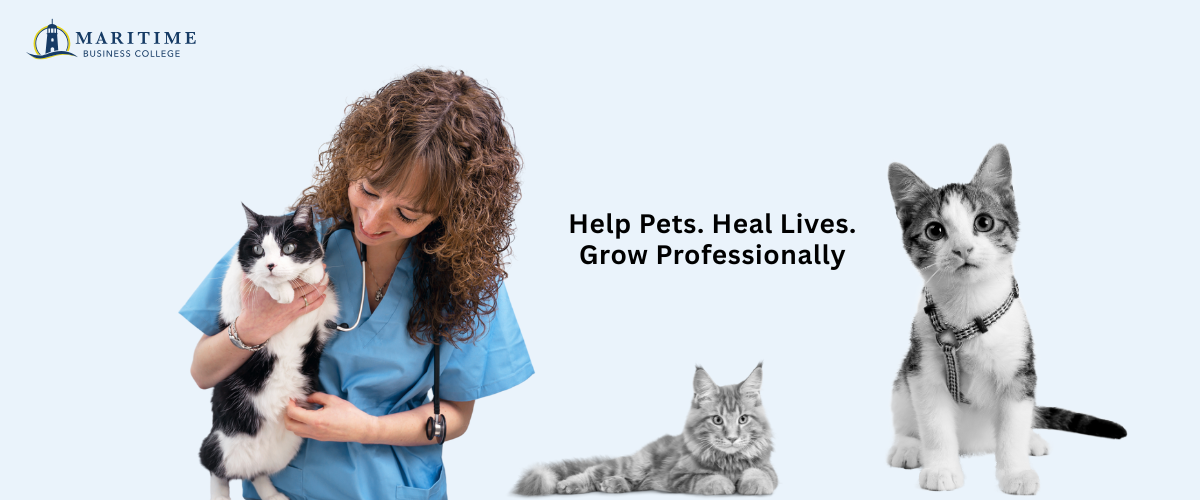Build your future in animal care with the Veterinary Assistant Course at Maritime Business College in Halifax, Nova Scotia. Gain hands-on skills, professional experience, and confidence to begin a rewarding career in animal healthcare
Have you ever thought of making a career in something you love, like animals? Well, if you are a student aged 16 to 24 years and are thinking about what to do after graduating from a high school program, animal veterinary courses in Halifax, Nova Scotia, could open some pretty big and interesting doors leading to a bright future for you. With veterinary assistants who make an average of $20.14 in Canada and about 7,800 new job vacancies being forecast in this profession, this is one of the most promising health-related pathways to choose for those who love animals.
Maritime Business College presents an 11-month Veterinary Assistant course that helps one get used to the environment within a clinic or animal hospital, or even a shelter. Experienced instructors, with practical training at your fingertips, will guide you through to graduation time and be ready for the profession in one of the fastest-growing fields in Canada.
This guide is for individuals who really feel that their true interest lies in caring for animals and are looking for a solid, constant profession in Halifax. It will guide you through all the necessary steps in understanding this subject matter, such as career opportunities, course outline, and why it could be the perfect career for you. The way to a more humane and safer future starts today.
What Are Animal Veterinary Courses and Why Choose This Career Path?
The Veterinary Assistant program at Maritime Business College is hosted at the Halifax Campus. It focuses on helping students gain practical skills. Students also build confidence to use these skills effectively. They learn to provide compassionate care for animals. The program emphasises cleanliness and safety in clinical settings. Students also support Veterinarians during patient care.
Why Choose a Career in Veterinary Care?
A veterinary service career is a vocation, not a job; compassion, skill, and science are all entwined together. This is what makes it rewarding since no day is ever the same. Among the activities of a veterinary assistant include, but are not limited to;
– Helping veterinarians with the examination or procedure process
– Offering comfort to anxious pets and their owners during visits
– Monitor and report observations on animal health.
– Assist the veterinarian in the feeding and exercising of animals daily.
This is the career path that is going to be full of purpose, professional growth, and job stability. Many learners are inclined to study such a program because they want to feel attached to work, take care of living beings, and contribute to their welfare.

Industry Outlook and Opportunities
According to Job Bank Canada, veterinary assistants and animal care workers earn between $16.55/hour and $33.04/hour, depending on experience and region. Statistics Canada also reports a 20% job growth rate for veterinary occupations across the country, with consistent demand in the Maritime provinces, including Nova Scotia. This strong employment outlook means you’ll be entering a field with long-term stability and advancement opportunities.
For students in Halifax looking for a meaningful and future-proof profession, animal veterinary courses offer both heart and opportunity — the perfect foundation for your journey into animal healthcare.
Types of Animal Care Careers Available in Nova Scotia
If you’re wondering how to start a career in animal care, Nova Scotia offers a variety of opportunities in both clinical and non-clinical settings. Veterinary hospitals and private clinics provide hands-on roles assisting with treatments, surgeries, and patient care. Emergency animal care centres and speciality practices, such as those focusing on dentistry or exotic animals, offer additional paths for those seeking variety.
Outside of clinical settings, graduates can work in pet daycares, boarding facilities, farms, kennels, shelters, and even zoos. There are also roles with animal rehabilitation centres, pet stores, and animal welfare organizations. The growing pet industry in Canada has created positions in pet insurance companies and research facilities. Each role allows individuals to contribute to animal well-being in unique and fulfilling ways, making Halifax an ideal city to begin a career in veterinary care.
How to Start a Career in Animal Care: Step-by-Step Guide for Students
If you’ve always loved animals but are not sure how to turn that passion into a real career, you’re not alone. Many students feel uncertain about where to begin or what qualifications they need. This step-by-step guide will help you understand exactly how to start a career in animal care—from learning the basics to gaining hands-on experience.
Step 1: Explore Your Interests and Career Goals
Before you enroll in any program, take time to understand what kind of work inspires you. Do you see yourself assisting veterinarians in a clinic, helping rescue animals, or working in a grooming or boarding facility? Knowing your ideal setting makes it easier to map your educational journey.
Step 2: Enroll in a Structured Veterinary Assistant Program
The most effective way to learn how to start a career in animal care is through education. Animal veterinary courses, like the 11-month Veterinary Assistant program at Maritime Business College, teach you the essential technical and interpersonal skills needed in this field. You’ll gain hands-on training, practical lab experience, and the confidence to work in professional settings.
Step 3: Gain Real-World Experience
Experience plays a key role in launching your career. Volunteering at local animal shelters or clinics helps you understand the daily rhythm of the job. MBC students also participate in practicum placements, giving them valuable exposure before graduation.
Step 4: Build Professional Connections
Networking is a powerful career tool. Connect with instructors, classmates, and professionals in the veterinary community through online platforms or local events. These connections often lead to job opportunities or mentorship.
Step 5: Stay Committed to Continuous Learning
Animal care is an ever-evolving field. Staying current with new medical practices, safety protocols, and technology ensures long-term career success.
Learning how to start a career in animal care might feel overwhelming at first, but with the right training, mindset, and guidance, you can confidently build a career that combines compassion with professional growth.

Educational Requirements for Veterinary Assistant Programs
To enroll in the Veterinary Assistant program at Maritime Business College, applicants must have a Grade 12 diploma or equivalent or complete a Nova Scotia Department of Advanced Education-approved admission assessment test. Strong communication skills and a genuine interest in animal welfare are key qualities for success. While specific science or math courses are not required, students who are curious about animal health and care tend to excel. Volunteering at animal shelters, caring for pets, or observing professionals in veterinary clinics can also provide valuable experience.
Skills Development During Veterinary Training
During the Veterinary Assistant Course in Halifax, students develop both technical and soft skills. Core courses such as Animal Nutrition and Immunology, Veterinary Software Applications, and Clinical Procedures help learners build technical expertise in handling animals, using medical tools, and understanding veterinary terminology. Students also practice administrative skills such as client reception, record management, and scheduling. Soft skills, including teamwork and communication, are emphasized throughout. The program also encourages ongoing professional development, networking, and learning opportunities that prepare students for long-term career success.
Practical Experience Through Practicum Placements
One of the most valuable parts of the Maritime Business College Veterinary Assistant program is the 8-week practicum placement, where students gain hands-on experience in a real veterinary care environment. During this placement, you’ll work alongside experienced professionals who provide mentorship, guidance, and feedback as you apply your classroom knowledge to real animal care situations.
Students may complete their practicum in veterinary clinics, animal hospitals, or shelters, giving them exposure to a variety of work settings. This experience not only strengthens technical and communication skills but also helps students build professional networks and explore future employment opportunities. Many graduates receive job offers directly from their placement sites, making the practicum an essential bridge between education and career success.
Enrol Maritime Business College Veterinary Assistant Program
If you’re ready to take your passion for animals to the next level, the veterinary assistant program at Halifax Maritime Business College is your perfect starting point. Designed with a strong balance of theory and hands-on learning, this program helps students transform their compassion for animals into a lifelong, rewarding career.
This diploma program focuses specifically on developing the skills and confidence required to assist veterinarians, provide patient care, and support clinic operations. Students are guided through every stage of professional growth from mastering clinical procedures and medical software to handling real-world cases during practicum training.
What truly sets the veterinary assistant program at Halifax apart is its industry-relevant curriculum, taught by instructors with professional experience in veterinary practice. Through small class sizes and personalized attention, Maritime Business College ensures every student receives the guidance they need to succeed.
The program is also designed for accessibility and flexibility, perfect for students looking to quickly begin a stable career or adults planning a meaningful career change. You’ll graduate with both the knowledge and hands-on experience to pursue employment in veterinary clinics, hospitals, or animal shelters across Nova Scotia and beyond.
By the end of your training, you won’t just earn a diploma, you’ll gain the confidence, connections, and career readiness to enter one of the most fulfilling fields in animal healthcare.
Program Duration and Structure
The Veterinary Assistant Diploma at Maritime Business College is a full-time, 11-month program designed to help students gain job-ready skills in under a year. The program is structured as a day program, allowing students to focus on hands-on learning and in-class instruction during the day. Throughout the course, students receive career and academic support to help them stay on track and prepare for employment after graduation.
Students receive approximately 20 hours of classroom instruction per week, typically scheduled from Tuesday to Thursday, with occasional Monday or Friday sessions for supplemental learning. In total, the program includes 720 instructional hours plus 200 practicum hours, for a combined 920 total program hours.
One of the biggest advantages of this program is its fast-track format, which allows you can graduate in less than a year, build both technical and practical skills for real-world application, and begin your career in animal care sooner. The next intake begins in September (Fall), and since class sizes are limited, early application is strongly encouraged to secure your seat.
Core Curriculum Overview
The veterinary training in Nova Scotia at Maritime Business College combines academic learning with practical skill development to prepare students for a rewarding career in animal care. Each course is designed to provide a balance of theory and real-world application, ensuring graduates are ready for the demands of a professional veterinary setting.

Animal Nutrition and Immunology
Students learn the fundamentals of canine and feline nutrition, infectious diseases, and vaccination protocols. The course emphasizes practical applications for different pet species and prepares students to educate clients on maintaining animal health and well-being.
Veterinary Software Applications
This module teaches students how to manage the medical data of a veterinary office using industry-standard software. Through simulated exercises, learners gain administrative and data management skills that improve overall efficiency in clinic operations.
Clinical Procedures
In this course, students role-play real-life scenarios they’ll encounter as Veterinary Assistants. Through hands-on practice and instructor feedback, they develop confidence in handling animals, assisting in procedures, and supporting veterinary teams in clinical environments. Facilities and Learning Environment
The Veterinary Assistant program at Maritime Business College offers modern veterinary training laboratories equipped with the latest tools and technology used in real clinical settings. Students gain hands-on experience with industry-relevant equipment, enhancing their technical confidence and practical knowledge. With small class sizes, learners benefit from personalized guidance and direct mentorship, maintaining an ideal student-to-instructor ratio for effective skill development. The campus provides an engaging and supportive atmosphere where theory seamlessly connects with practice. Prospective students are also encouraged to take a campus tour to explore the specialized training spaces and see firsthand how the college fosters an immersive and professional learning environment dedicated to animal care excellence.
Career Opportunities After Completing Animal Veterinary Courses
After completing the Veterinary Assistant Course, graduates are well-positioned to enter the workforce in Halifax and beyond. The current job market for veterinary assistants in Canada is strong, with average wages around $20.14 per hour and opportunities expanding across the Maritime provinces. Over 7,800 new openings are projected in the coming years, largely due to increasing pet ownership and a growing need for qualified staff.
Workplace Settings for Veterinary Assistants
Veterinary assistants can work in clinical environments such as private practices, animal hospitals, and emergency clinics, or in non-clinical settings including shelters, boarding facilities, and pet stores. Specialized opportunities also exist in research labs, wildlife centres, and rehabilitation facilities. Each work setting provides unique rewards, and graduates can choose paths that best match their interests and lifestyle.
Financial Investment and Return of Animal Veterinary Courses
Pursuing a veterinary assistant education is a meaningful investment in your future. While tuition and supplies represent an initial cost, the program’s short duration and strong employment prospects mean students can begin earning quickly. Maritime Business College offers flexible payment plans and provides guidance on accessing financial aid or government student loans. Scholarships and funding options may also be available for eligible students.
Return on Investment Analysis
Veterinary assistants in Canada earn competitive wages, with some earning more than $55,000 annually as they gain experience or take on specialized roles. Beyond financial rewards, this career offers job stability, emotional fulfilment, and opportunities for growth into supervisory or technician positions.

Student Success Stories and Graduate Outcomes
Many Maritime Business College graduates have transitioned smoothly into fulfilling animal care careers. Graduates report high satisfaction, with strong employment rates within six months of completing the program. One student shared, “What a great year! I learned so much on both an academic and a personal level. Thank you so much!” These success stories reflect the program’s emphasis on practical skills and supportive learning environments that prepare students for the real world.
Application Process and Admission Requirements
Applicants interested in the Veterinary Assistant program must have a Grade 12 diploma or equivalent, or successfully complete a Nova Scotia Department of Advanced Education-approved admission assessment test. Each applicant is required to submit a Letter of Intent, a Letter of Reference, and a Resume as part of their application package. The program seeks individuals who are passionate about working with animals and eager to gain both administrative and clinical skills in a veterinary care environment. Students are trained through a combination of classroom learning and hands-on experience, preparing them for a rewarding role as part of a veterinary team. Admission is based on meeting these academic and document requirements.
Is veterinary a good career in Canada?
Building experience before starting your studies can strengthen both your application and your confidence. Volunteering at shelters, pet-sitting, or observing veterinary clinics are great ways to prepare. Developing essential skills such as stamina, empathy, communication, and organization will also help you thrive in both school and your future workplace.
Frequently Asked Questions About Animal Veterinary Courses
Is veterinary a good career in Canada?
Yes, it is a rewarding and stable field with strong job growth. Veterinary assistant roles are expected to grow by about 20 percent nationwide, offering consistent opportunities and high satisfaction rates.
What qualifications do I need for veterinary assistant programs?
Most programs, including ours, require high school completion with science and math courses recommended. Students should also be prepared for hands-on work and demonstrate a caring attitude toward animals.
How long does it take to become a veterinary assistant in Nova Scotia?
At Maritime Business College, students can complete their Veterinary Assistant Course in approximately 11 months, including practical training.
What’s the difference between a veterinary assistant and a veterinary technician?
Veterinary assistants provide essential support in daily animal care and clinic operations, while veterinary technicians typically require more advanced training and perform medical procedures under a veterinarian’s supervision.
Can I work while studying veterinary assistant courses?
Many students balance part-time work with studies. The program’s structured schedule and faculty support make it possible to manage both responsibilities successfully.
Conclusion of Animal Veterinary Courses
A career in animal care offers more than just a job it provides the opportunity to make a real impact in the lives of animals and their owners. With strong job prospects, competitive salaries, and growing demand across Canada, becoming a veterinary assistant is both a rewarding and practical choice.
At Maritime Business College, our Veterinary Assistant Course helps students develop the skills, confidence, and experience needed to thrive in this meaningful profession. If you’re passionate about animal care and ready to begin your career journey, we invite you to learn more about our program and explore how we can help you take the next step toward your future in veterinary care.